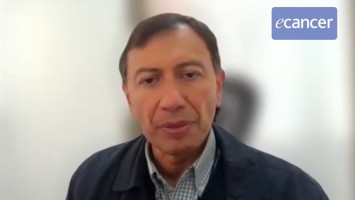I gave a keynote which was entitled ‘Health and Human Rights’. If you look at cancer as a specific disease the inequity of access to healthcare for people with cancer is particularly exemplified by the situation between the north and the south or between Africa and other developing countries and the rest of the world. Cancer is not perceived as an important disease on the public health agenda so the health agenda in Africa has been dominated by malaria, tuberculosis, HIV, maternal mortality. However, if you take all the women in Africa, if you develop breast and cervical cancer it’s much more than the number of women who die in childbirth. The number of women who die in childbirth, which in and of itself is disgraceful and there’s a huge disparity between maternal mortality in Africa versus other parts of the world, but that figure has been brought down through the Millennium Development Goals where the world got together and it was what I call one of the great disgraces that a woman was dying in childbirth. But in terms of cancer there are very few countries that even have national cancer control programmes. There are preventable cancers such as cervical cancer, through screening or human papilloma virus vaccination, hepatitis B vaccination prevents liver cancer and there are other infection related cancers and there are no real programmes to tackle the preventable cancers. Then, worse still, is that when people develop symptoms either they don’t interpret the symptoms correctly, so that’s a kind of patient contribution which is small, or the health system healthcare professionals are not aware of how to make the diagnosis and then the health system is actually, in most sub-Saharan African countries, very weak. We saw that in the Ebola crisis. So there’s a lot more cancer in African than we actually realise but we don’t have good data, we don’t have good death notification, we don’t have good death registries and we don’t have good cancer registries.
So I see this all as a human rights issue because in some ways if you’re born in New York and you develop cancer, despite it being much more common in the developed world, you will get access to diagnosis, early detection, treatment although there are underserved populations in developed countries. Whereas in Africa most countries don’t have any form of treatment facilities, they don’t have pathology, they don’t have proper x-ray facilities, they don’t have treatment facilities and so on. So that was what I was trying to give a broad overview and contextualise why cancer is important in sub-Saharan Africa.








